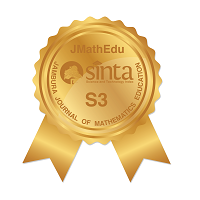Meningkatkan Hasil Belajar Matematika Siswa Pada Materi Matriks Melalui Penerapan Model Pembelajaran Kooperatif Tipe NHT
Abstract
Keywords
Full Text:
PDFReferences
K. Usman, I. Djakaria, and S. Hasan, "Deskripsi Hasil Belajar Siswa Ditinjau Dari Kemampuan Pemecahan Masalah Matematika", J. Karya Pendidik. Mat., vol. 8, no. 1, pp. 13-17, 2021.
V. T. Kadir, N. Nurwan, S. Zakiyah, and A. D. Mohidin, "Deskripsi Kesulitan Belajar Matematika Siswa Pada Pokok Bahasan Bilangan Berpangkat di SMP Negeri 1 Biliuhu", Jambura J. Math. Educ., vol. 3, no. 1, pp. 38-47, Mar. 2022.
F. Suleang, N. Katili, and S. Zakiyah, "Analisis Kemandirian Belajar Siswa Melalui Pembelajaran Daring Pada Materi Mata Pelajaran Matematika", Euler J. Ilm. Mat. Sains dan Teknol, vol. 8, no. 1, pp. 29-35, 2020.
Netriwati, "Analisis Kemampuan Pemecahan Masalah Matematis Berdasarkan Teori Polya Ditinjau Pengetahuan Awal Mahasiswa IAIN Raden Intan Lampung", Al-Jabar: Jurnal Pendidikan Matematika, vol. 7, no. 2, pp. 181-190, 2016.
R. Taha, S. Q. Badu, and A. Arsyad, "Meningkatkan Hasil Belajar Siswa Melalui Model Pembelajaran Kooperatif Tipe Team Assisted Individualization", Jambura J. Math. Educ., vol. 3, no. 2, pp. 147-154, 2022.
F. Nurulaeni and A. Rahma, "Analisis Problematika Pelaksanaan Merdeka Belajar Matematika", Jurnal Pacu Pendidikan Dasar, vol. 2, no. 1, pp. 35-45, 2022.
P. Zakaria, Nurwan, and F. D. Silalahi, "Deskripsi Kemampuan Berpikir Kritis Siswa Melalui Pembelajaran Daring Pada Materi Segi Empat", Euler J. Ilm. Mat. Sains dan Teknol, vol. 9, no. 1, pp. 32-39, 2021.
T. A. Usman, K. Usman, S. Zakiyah, A. W. Abdullah, A. Kaluku, F. A. Oroh, "Pengaruh Model Problem Based Learning Terhadap Kemampuan Pemecahan Masalah Matematika Siswa pada Materi Aritmatika Sosial di SMP Negeri 2 Limboto", Irfani: Jurnal Pendidikan Islam, vol. 17, no. 2, pp. 146-156, Des. 2021.
N. Baid, E. Hulukati, K. Usman, S. Zakiyah, "Pengaruh Model Pembelajaran Talking Stick Untuk Meningkatkan Hasil Belajar Matematika Siswa Pada materi Aritmetika Sosial", Euler J. Ilm. Mat. Sains dan Teknol, vol. 10, no. 2, pp. 164-172, 2022.
Y. Pakaya, A. W. Abdullah, and D. R. Isa, "Analisis Hasil Belajar Matematika Siswa Pada Materi Persegi dan Persegi Panjang Ditinjau Dari Perbedaan Gender di Kelas VII SMP Negeri Suwawa Timur", LAPLACE: Jurnal Pendidikan Matematika, vol. 5, no. 1, pp. 19-29, 2022.
H. Le, J. Janssen, & T. Wubbels, "Collaborative learning practices: teacher and student perceived obstacles to effective student collaboration", Cambridge Journal of Education, vol. 48, no. 1, p. 103-122, 2017.
M. Mauliza, "Improving students' learning result using numbered heads together model", International Journal for Educational and Vocational Studies, vol. 2, no. 3, 2020.
M. Pamungkas, "Improving students' attitudes toward mathematics through numbered heads together cooperative learning models with scientific approach", Indonesian Journal of Mathematics Education, vol. 2, no. 1, p. 27, 2019.
Zakaria, E., Chin, L. C., & Daud, M. Y., "The effects of cooperative learning on students' mathematics achievement and attitude towards mathematics", Journal of Social Sciences, vol. 6, no. 2, p. 272-275, 2010.
E. Retnowati, P. Ayres, & J. Sweller, "Can collaborative learning improve the effectiveness of worked examples in learning mathematics?", Journal of Educational Psychology, vol. 109, no. 5, p. 666-679, 2017.
D. Sari, "The students' mathematical communication ability taught by cooperative script types at smp negeri 3 kisaran", Journal of Didactic Mathematics, vol. 3, no. 1, p. 35-41, 2022.
D. Dafid, B. Wibawa, & R. Situmorang, "The effect of laboratory-based learning strategies and mathematic logical intelligence on learning outcomes of linear algebra courses", International Journal of Social Science Research and Review, vol. 5, no. 9, p. 413-437, 2022.
Arpiah, "Penerapan Model Pembelajaran Kooperatif Tipe NHT Untuk Meningkatkan Minat dan Hasil Belajar Matematika", Jurnal PRIMATIKA, vol. 9, no. 1, pp. 43-52, 2020.
H. Machfud, "Penerapan Model Pembelajaran Kooperatif tipe Numbered Heads Together (NHT) Untuk Meningkatkan Respons, Aktivitas, dan Hasil Belajar Siswa", Al-Khwarizmi: Jurnal Pendidikan Matematika dan Ilmu Pengetahuan Alam, vol. 6, no. 2, pp. 105-120, 2018.
DOI: https://doi.org/10.37905/jmathedu.v4i2.17473
Refbacks
- There are currently no refbacks.
Copyright (c) 2023 Jambura Journal of Mathematics Education

This work is licensed under a Creative Commons Attribution-NonCommercial 4.0 International License.
Jambura Journal of Mathematics Education has been indexed by:
EDITORIAL OFFICE OF JAMBURA JOURNAL OF MATHEMATICS EDUCATION |
 | Department of Mathematics, Universitas Negeri Gorontalo Jl. Prof. Dr. Ing. B. J. Habibie, Moutong, Tilongkabila, Kabupaten Bone Bolango, Gorontalo 96554, Indonesia |
 | Email: [email protected] |
 | +6285255745923 (Call/SMS/WA) |
 | Jambura Journal of Mathematics Education (JMathEdu | eISSN: 2721-7477) by Department of Mathematics Universitas Negeri Gorontalo is licensed under a Creative Commons Attribution-NonCommercial 4.0 International License. Powered by Public Knowledge Project OJS. |



















